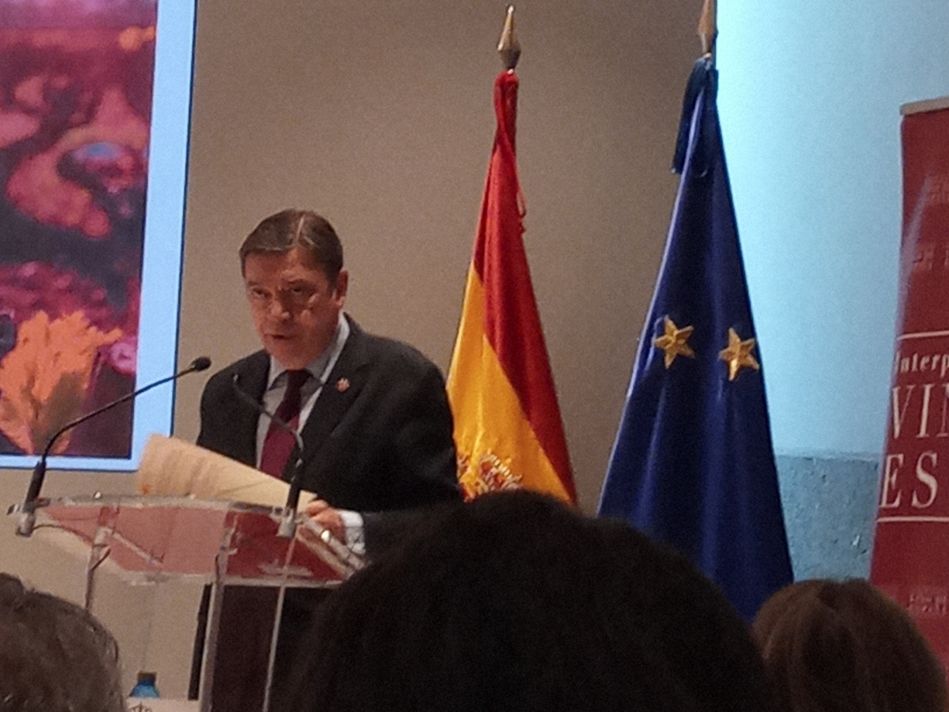
The Spanish wine sector roadmap for the next five years was presented
Ángel Villafranca, president of the Interprofessional of Wine: «We have to forget to step on each other in the sector and work together to advance with future».
The strategic plan for the Spanish wine sector was presented today in Madrid. This is the road map for the wine sector for the next five years and has counted on the work of all actors in the sector for a year to achieve the necessary unity of action. The strategy in the wine sector has led to 22 initiatives and 101 associated actions, with an important section on the promotion of wine tourism.
«With will, organization and coordination we will achieve the goals we want to achieve in the Spanish wine sector,» said Susana García, director of the Spanish Wine Interprofessional. Garcia said «that we are on the path of promoting wine in Spain to recover the Spanish consumer» and announced the next campaign in Spanish airports to make foreign tourists aware of Spanish wines.
For his part, Angel Villafranca, president of the Interprofessional of Wine, considered that there will be a before and after after the implementation of the strategy of the wine sector, which summarized in figures: There are a million hectares of vineyards, «that help us to maintain the environment and breathe»; more than 500,000 winegrowers, «who are helping Spain to be less empty», the existence of more than 4,000 wineries that means half a million people also linked to the sector, and more than 100 Denominations of Origin.
Villafranca said that «we have to forget to step on each other in the sector and work together to move forward with the future». «Let us look at the consumer, let us look at the good professionals, let us value our tradition and ecology; remembering that we are pioneers in this area». «Let us not think that this strategic plan is a dogma but it will be a document of reflection and analysis «.
The strategy of the Spanish wine sector for the coming years was described by the minister of the sector, Luis Planas, as «interesting and complete». The study was supported by the Ministry of Agriculture, Fisheries and Food in its analysis phase. Planas said that Interprofessional Wine has to take advantage to face challenges such as the rebalancing of supply and demand; adaptation to climate change, responding to consumer demands, and environmental, economic and social sustainability. «If sustainability is not profitable, it is not such sustainability,» he said.
Also, Planas said that the sector will improve «if we have clear guidance and work plan on quality, sustainability, brand image and take advantage of our tourism potential». The Ministry of Agriculture, Fisheries and Food continues its line of promotion to wine through its strategy Food of Spain, its sponsorship in monographic fairs and programs to the wine sector to increase the value and promotion of wine, as well as in the proper and responsible consumption of wine. In this sense, Planas said that «we must not confuse public opinion and put things in their place».
Last Council of Ministers in Brussels
Planas took the opportunity to announce that at the last Brussels Council of Ministers the green light for Spain’s National Strategic Plan in the agricultural policy 2023-2027 has been obtained, and also reported that Spain has entered the first group along with France, Denmark, Poland and Portugal. Regarding the wine sector, Planas said that 202 million euros per year have been obtained in 5 years. Other measures are the extension in the system of authorization of vineyards until 2025, «which gives us margin and a security», and the incorporation of the area not covered through national reserve. Planas also announced that during the first half of 2023, Cadiz will be the host city for the celebration of the next International Vine and Wine Congress.
A round table allowed to analyze the strategy of the Spanish wine sector. Joaquín Vizcaíno, head of the wine sector of COAG (Coordinator of Farmers’ and Livestock Organizations) considered that this new road map means putting in value the place that corresponds to Spain in the world, compared to Italy and Spain. «It is a moment of revisionism: The history of wine in the world is not understood without the history of Spain in the sector». Vizcaíno added: «Without winegrowers there is no wine and for that there must be a new distribution of values in the sector». «There must be social, environmental and economic sustainability,» he concluded.
For his part, Fernando Villena, responsible for the wine sector of the Association of Young Farmers (ASAJA) said that in the sector «we need social peace; all live from our work and for this there must be profitability».
Fernando Ezquerro, president of the wine sector council of Agricultural and Food Cooperatives of Spain, summarized that «the product must be valued and for this we have tools such as history and tradition, betting on those tools in our wineries, environments and landscapes».
Ruth Chocarro, vice president of Institutional Relations of the Spanish Wine Federation (FEVI) said that although we have many strengths, «the price of wine is very low in Spain», and also the consumption model in Spain is below other producing countries». «We have to sell the products at a higher price to increase their value». Ruth also indicated that «we are self-conscious; we have to believe the product; let that be seen inside and outside Spain». And he bet on innovation and digitization.
SOURCE: LANZADIGITAL.COM
